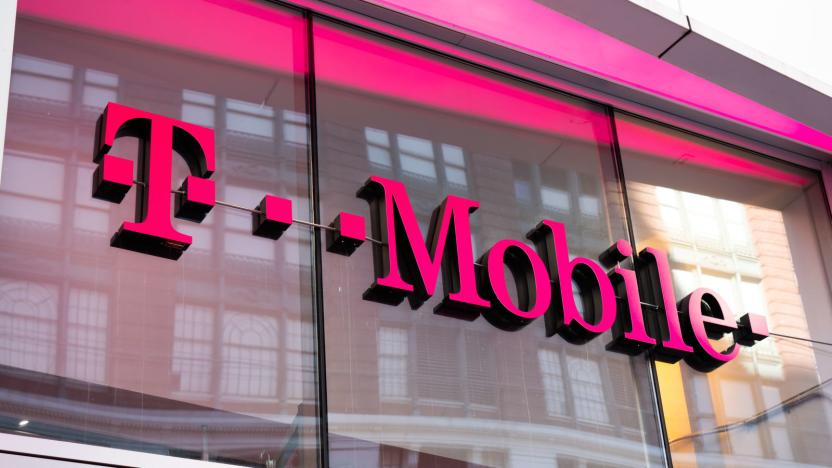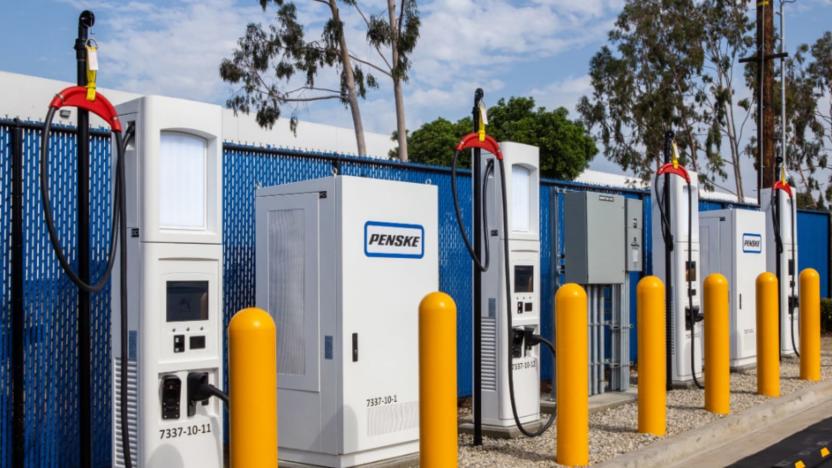high-speed
Latest

T-Mobile launches its $15 5G plan ahead of the Sprint merger
To help people stay connected during the coronavirus pandemic, T-Mobile is launching its new $15-per-month 5G plan ahead of schedule. Originally, T-Mobile said it would launch the plan, called T-Mobile Connect, after its merger with Sprint finalized. Last we heard, that deal could close on April 1st, but now, T-Mobile Connect will be available on Wednesday.

Penske debuts fast charging stations for electric delivery trucks
Today, Penske Truck Leasing opened 14 DC fast charging stations at four facilities in Southern California. According to the company, they're the first high-speed charging stations specifically designed for heavy duty, commercial electric vehicles in the US. And they'll be used to charge semi trucks, like the Daimler Freightliners that Penske has been testing.

Samsung, Foxconn back 'Kiss' high-speed wireless transfer tech
Samsung, Foxconn and other smartphone industry firms are backing a new standard that would let you wirelessly download large files in seconds. Called "Kiss," it was developed by a company called Keyssa, which has investors like former Apple and Google exec Tony Fadell, along with Samsung, Dolby, Intel and other companies. By placing two devices equipped with the tech close to each other, you can do "gigabit-sized" transfers in seconds, Keyssa says.

Caltrain asks White House to reverse high-speed rail funding cut
After Republicans successfully lobbied US Transportation secretary Elaine Chao to halt approval of a $650 million dollar grant for an electrification project that would have laid the groundwork for a high-speed rail network, Caltrain is asking the public for its support in getting that decision reversed.

Samsung readying crazy fast next-gen WiFi devices
Samsung has revealed that by 2015 it may be selling WiFi devices that use unlicensed, 60GHz spectrum to transfer data at 575MB/s -- five times faster than current tech. If that sounds familiar, it's also the WiGig Alliance's 802.11ad WiFi standard, which has a moderately faster theoretical speed of 875MB/s. However, "theoretical" is the operational word -- in practice, WiGig bounces off walls rather than penetrating them, so speeds drop rapidly without line-of-sight transmission. In addition, WiGig's short wavelengths are susceptible to interference by other devices. Samsung claims it's solved those problems by using beam-forming antennas that adapt to changing conditions in less than 0.33 milliseconds. It plans to put the tech in a variety of devices, including its Smart Home and mobile products as early as next year. We're not sure if those devices will conform to the WiGig standard or fork it, so we've reached out to Samsung for more info. [Image credit: JOSEP LAGO/AFP/Getty Images]

Samsung brings speedy UHS-I class SD and microSD memory cards in new 64GB sizes to IFA 2012
We've seen UHS-I class SD and microSD cards capable of incredible speeds before, and Samsung unveiled a few 16GB microSD modules of its own earlier this year, but now it's showing off 64GB sized versions at IFA 2012. The top of the line Pro editions intended for high speed LTE-connected phones and tablets are capable of read/write speeds at 80MB/40MB per second (SD) and 70MB/20MB per second (microSD). If you're not with us in Germany, you should be able to get your hands on them in mid-October.

Comcast doubles broadband speeds 'in certain markets,' launches 305Mbps Xfinity Platinum service
Comcast has just done the deed -- following a rumor on the matter, it's launching 305Mbps (down) / 65Mbps (up) Xfinity Platinum internet service in the highly populated Northeast division of the United States. For those who've been around a while, you may remember a time where one would weep upon finding out that Verizon's FiOS simply wasn't available at a desired location. Now, however, Comcast is doing its darnedest to rival fiber-to-the-home options with blisteringly fast cable service. In addition to its new flagship tier, the provider is also doubling the speeds of two of its existing internet speed tiers in certain markets at no additional cost. Specifically, Xfinity Blast! customers will now get download speeds of up to 50Mbps (formerly 25 Mbps), and Extreme 50 customers will now receive speeds of up to 105Mbps (formerly 50 Mbps). According to GigaOM, the ultra-desirable Platinum service will ring up at $300 per month, which is a full $90 more than Verizon's own 300Mbps FiOS option. Of course, this probably means that you'll hit your monthly cap a heck of a lot faster, but hey -- at least you'll get bragging rights.

Alt-week 7.14.2012: Bleeping sheep and ATLAS art
Alt-week peels back the covers on some of the more curious sci-tech stories from the last seven days. While there might not quite have been the epic science news that we had last week, that doesn't mean that there isn't plenty going on in the world of Alt. In this installment we get to see how CERN tricks out its offices, how one farmer tries to keep his flock, and learn about how the military will be high-tailing around the planet in just a few years. This is alt-week.

ASUS Transformer Pad TF300 with LTE stretches its legs on O2 in Germany (video)
It wasn't all that long ago, that the FCC tempted us with the idea of an LTE capable Transformer Pad TF300. Now, a video has popped up online from Germany's O2 network showing of the speedy tablet in all its 42 Mbps down / 32 Mbps up glory. After the obligatory speed test, you can see YouTube videos loading up a charm, along with plenty of other HD video being scrubbed along like it wasn't even a thing. A quick tour of the white-backed version reveals little else of note, but if the lack of LTE was keeping the dollars in your wallet, this might just be enough to tease them back out. [Thanks, Alexis]

Gigabit Squared strikes deal to bring ultra high-speed broadband to six communities
It's still way too early for anyone to start ditching their existing broadband connections, but it looks like a few more communities in the US will be getting some ultra high-speed broadband networks to call their own. Ohio-based Gigabit Squared announced today that it's secured $200 million in funding to bring gigabit-speed networks to up to six different communities -- communities that have unfortunately not yet been named. What we do know is that the communities will all be ones centered around research universities, which themselves will be partners in the Gig.U initiative (an effort that has already enlisted more than 30 institutions). As The New York Times reports, Gigabit Squared is currently in talks with the first university in line for the rollout, and it apparently plans to make more announcements about timing and participation "later this year."

Google Fiber rollout now ready to begin in both Kansas Cities
It reportedly suffered a slight delay due to some disagreement with local officials over just how its thousands of miles of wires would be hung, but Google announced today that it's finally ready to begin the rollout of its Google Fiber network in Kansas City, Kansas and Kansas City, Missouri. Expectedly, that effort will initially focus on the network's backbone, after which Google will then turn its attention towards connecting homes and businesses in the two cities to the gigabit network (promising speeds 100 times faster than the average high-speed connection). Unfortunately, there's still no firm word as to when the first customers can expect that to happen.

Vision Research's Phantom v1210 and v1610 do slow motion in style (video)
No matter how fast that piece of Jell-O landed on the floor, you'll be able to review the journey in all its slow motion glory with the newly announced Phantom v1610 and v1210 cameras. Vision Research is calling the latest entries in the Phantom line the "world's fastest one megapixel digital high-speed cameras." The v1210 is capable of capturing 12,000 fps to 16,000 fps, with its higher end buddy the v1610 capturing between 650,000 fps and one million fps, if you sacrifice resolution. Shooting 1280 x 800 widescreen images (at regular speed), the v1210 boasts 12GB, 24GB, or 48GB of segmented memory, while the v1610 can hold 24GB, 48GB, or 96GB of segmented memory. Other features include an image-based auto-trigger, ethernet port, SMPTE & IRIG timecode, genlock, 28 micron pixel size, 12-bit depth pixel depth standard, and an HD-SDI output. No word on pricing, but if you have a budget like NFL Films, let the epic sports montages and Truffle Shuffling commence. Check out some slow motion footage captured on the Phantom HD Gold after the break. Update: pricing starts around a cool $100,000.

Google Fiber puts boots on the ground, begins detail engineering in Kansas Cities
We've come a long way since Google first started taking about launching a fiber-based ISP -- from beta tests, to hopeful communities, to Topeka fools day, to selecting not one, but two Kansas Cities. Now, it's "boots on the ground," time according to the Google Fiber blog: detail engineering starts now. In the coming weeks, Kansas City residents (presumably on both sides of the Kansas / Missouri border) can expect to see El Goog's engineers measuring phone poles, gathering geographical data, and asking hard-hitting questions, like "What is your address?" All this footwork will help Google get a head start on building that sweet, ultra-high-speed gigabit network. Not the most glamorous bit of Google magic we've ever seen, but it's still exciting to hear that preliminary work has begun. Of course, it would be even more exciting if this were coming where we lived.

Gig. U hopes to bring Gigabit networks and straight cash, homey, to university communities
Familiar with Johnny Appleseed? He who traipsed 'round the country with a sack 'o seeds on his shoulder, planting trees hither and yon leaving apple orchards blooming in his wake? Gig. U is similar, only it's a project that aims to plant Gigabit networks in 29 collegiate communities to facilitate research, attract start-ups, and stimulate local economies. The plan is just getting underway, and the schools in question -- including Virginia Tech, the University of Hawaii, and the University of Alaska -- are asking private telcos and companies to help make their high-speed dreams a reality. In addition to benefiting the immediate areas, Gig. U sees these swift new networks functioning as hubs in a faster nationwide broadband system. The colleges claim that construction of these new information superhighways won't start for several years, so it'll be some time before they can help elevate us from our current state of broadband mediocrity. Chop, chop, guys.

NEC makes content addressable memory that takes data deposits sans power, RAM green with envy
Wouldn't it be great if system memory was super speedy like RAM and non-volatile like flash? Well, NEC and Tohoku University's new content addressable memory (CAM) has accomplished the trick -- it promises five-nanosecond retrieval speeds equal to sticks of DDR3 1600 and can store data even when the power's off. Spintronics logic is what makes the magic happen by setting the spin direction of electrons and using their interaction with magnetic forces to store bits of data. Those spinning attributes are then kept on the circuit even when there's no electricity flowing. The catch? This new CAM big -- 90nm compared to the 30nm DRAM currently available -- despite the fact it's half the size of previous CAM chips, and NEC's not telling how quickly it can write data. Of course, the tech is still in its developmental stages, so we won't getting its zero-power standby mode and instant-on capabilities in our gadgets for some time. PR after the break.

Google adds Kansas City, MO to list of Kansas Cities covered by ultra high-speed internet (video)
It's gotta be rough being a Kansas City sometimes. It must be a constant cycle of excitement, only to realize that everyone was talking about your identically-named neighbor -- like back in late March, when Google first announced plans to bring its ultra high-speed internet fiber to the Kansas side of the border. Things are looking up for our friends in Kansas City, Missouri, however -- the city's awesomely-named Mayor Sly James held a press conference with Google and Kansas City Power & Light today to announce that his town will be joining in on the bandwidthy fun. Both Kansas Cities can expect to go ultra high-speed next year, pricing on either side of the invisible line remains elusive. Video of joyous local government officials after the break.

First light wave quantum teleportation achieved, opens door to ultra fast data transmission
Mark this day, folks, because the brainiacs have finally made a breakthrough in quantum teleportation: a team of scientists from Australia and Japan have successfully transferred a complex set of quantum data in light form. You see, previously researchers had struggled with slow performance or loss of information, but with full transmission integrity achieved -- as in blocks of qubits being destroyed in one place but instantaneously resurrected in another, without affecting their superpositions -- we're now one huge step closer to secure, high-speed quantum communication. Needless to say, this will also be a big boost for the development of powerful quantum computing, and combine that with a more bedroom friendly version of the above teleporter, we'll eventually have ourselves the best LAN party ever.

Intel distributing Thunderbolt developer kits this quarter, more peripherals on the way
According to IDG News, Intel announced yesterday that Thunderbolt developer kits would be making their way out to manufacturers within this quarter, opening up development for the fledgling standard. The technology, previously known by its code name 'Light Peak,' began shipping on the 2011 MacBook Pro line, replacing the mini DisplayPort socket of the previous iteration. The fully backwards compatible specification, which was announced on the 24th of February this year, encompasses both DisplayPort and PCI Express in a dual-channel, high-speed interconnect. Promising speeds of up to 10 Gbps along copper cables, there's a lot of potential for products that require high-speed connections but a minimum amount of cables. Companies including Canon, Matrox, AJA, LaCie and Western Digital have shown off products already, but none have made it to market as yet. Intel is hoping that by distributing developer kits, it can get a plethora of Thunderbolt-connected products hitting the shelves quickly, not just external hard drives, which is great news for MacBook Pro users. The holy grail of the one connector to rule them all may be a little ways off just yet, but with a bit of luck, we'll start to see some decent uses for Thunderbolt, short of the standard DisplayPort connection, in the very near future.

Phantom Flex camera slows down time, drops jaws with incredible 2,564fps slowmo footage (video)
Ever wanted to see flowing water slowed down to the point of transforming into a series of airborne droplets? This video has that. And more. A chap by the name of Tom Guilmette got to work with a Vision Research Phantom Flex camera recently, and, being the true geek that he is, he put together a video composition of staggering slow-motion footage. When pushed to its limit, the Phantom is capable of filling every second of 1080p recording with 2,800 frames, though Tom mercifully ran it at a lower 2,564fps speed. That's still sufficient temporal resolution to let you track the wave of an impact's vibration as it travels up a BlackBerry's body -- oh yeah, it's as awesome as it sounds.

BT 'Content Connect' lets ISPs charge content providers for high-speed video delivery
We haven't heard a ton of talk about net neutrality here at CES, but the issue has now cropped up in a fairly big way across the pond -- British Telecom's wholesale division has just rolled out a service it calls "Content Connect," which basically allows ISPs relying on BT's network to charge content providers like YouTube for high-speed delivery of video within the UK. That naturally means that anyone who doesn't pay will have to deal with slower video delivery, which would in a very real sense create a two-tier internet. For its part, BT insists that it "supports the concept of net neutrality," and it says that the new service will actually speed up download speeds even for those that don't pay up, as it would ease network congestion. All which, of course, echoes some of the core arguments we've been hearing for years now, and won't likely stop hearing anytime soon. [Thanks, Pete]












